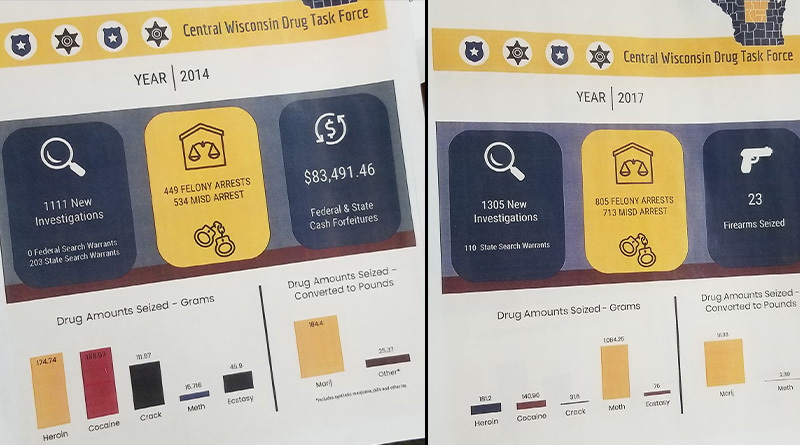Coalition recognizes Nov. 30 as ‘Meth Awareness Day’
By Brandi Makuski
Availability of methamphetamine in Wisconsin has increased by about 250 percent since 2011, according to local law enforcement, and Nov. 30 is the day to stop and remember the dangers of its use.
Meth Awareness Day is the result of a partnership between the Portage County Coalition for Alcohol & Drug Abuse Prevention, Marshfield Clinic Health System, Northwoods Coalition, Alliance for Wisconsin Youth, the Wisconsin Department of Justice, and the Wisconsin Department of Health.
“This day is an opportunity for everyone in Wisconsin to learn more about the dangers of meth use and addiction, and what actions can be taken to prevent it,” reads a news release from Portage Co. Health and Human Services sent late Thursday. “Meth is becoming more prevalent in Wisconsin and Meth Awareness Day allows the community to work together to help fight this growing epidemic.”
According to the Wisconsin Dept. of Health, meth is white, odorless, bitter-tasting crystalline powder that easily dissolves in water or alcohol that is highly-addictive to the central nervous system. A key ingredient is pseudoephedrine, which is found in many over-the-counter cold medicines, mixed with several other inexpensive household ingredients.
Meth increases the levels of naturally-occurring dopamine and norepinephrine in the brain, making its effects last longer than those of other illicit drugs, and is typically cheaper.
As a part of Meth Awareness Day, the following tips are offered:
-Talk to your children and family members about the risks and dangers of meth use
-Get involved in your local KNOW METH campaign
-Get involved in your local coalition
-Monitor the use of pseudoephedrine (cold medicine) in your home
-Refuse to purchase pseudoephedrine for another person
Anyone who believes they may have encountered a meth lab should contact law enforcement immediately. Some of the telltale signs include large amounts of acetone, drain cleaner, cold tablets, battery acid, paint thinner, and freon, accompanied by cookware or glassware containing powdery residue.
Suspicious activity should be reported to law enforcement’s drug tip line: 1-800-622-3784.


